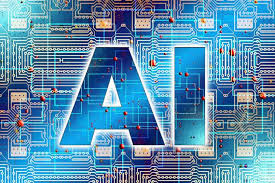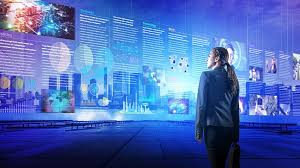The Rise of AI Technology: Transforming the Future
Artificial Intelligence (AI) technology has rapidly evolved from a futuristic concept to an integral part of everyday life. Its applications span across various sectors, revolutionizing industries and reshaping how we interact with the world.
What is AI Technology?
AI technology refers to the development of computer systems that can perform tasks typically requiring human intelligence. These tasks include learning, reasoning, problem-solving, perception, and language understanding. AI systems are designed to process vast amounts of data, recognize patterns, and make decisions with minimal human intervention.
Key Applications of AI
- Healthcare: AI is transforming healthcare by enabling more accurate diagnoses, personalized treatment plans, and efficient drug discovery processes. Machine learning algorithms analyze medical data to predict patient outcomes and improve care quality.
- Finance: In the financial sector, AI is used for fraud detection, risk management, and algorithmic trading. By analyzing market trends and consumer behavior, AI helps financial institutions make informed decisions.
- Transportation: Autonomous vehicles represent one of the most groundbreaking applications of AI in transportation. Self-driving cars use AI to navigate roads safely by processing real-time data from sensors and cameras.
- Retail: Retailers leverage AI for inventory management, customer service chatbots, and personalized shopping experiences. By understanding consumer preferences through data analysis, retailers can enhance customer satisfaction.
The Impact on Society
The integration of AI technology into various aspects of life has profound implications for society. While it offers numerous benefits such as increased efficiency and innovation, it also raises ethical concerns regarding privacy, job displacement, and bias in decision-making algorithms.
Ethical Considerations
The ethical use of AI involves ensuring transparency in decision-making processes and safeguarding user privacy. There is an ongoing debate about how to address biases inherent in training data that may lead to unfair outcomes in automated decisions.
The Future of Work
As AI continues to automate routine tasks across industries, there is growing concern about its impact on employment. However, many experts argue that while some jobs may be displaced by automation, new opportunities will emerge in fields related to AI development and maintenance.
The Road Ahead
The future of AI technology holds immense potential for further advancements that could redefine human capabilities. As researchers continue exploring new frontiers in machine learning and neural networks,
the possibilities seem limitless.
However,
it remains crucial for policymakers,
developers,
and society at large
to work together
to ensure
that this powerful tool
is used responsibly
for the greater good.
Together,
we can harness
the power
of artificial intelligence
to create a better future.
Understanding AI Technology: Key Questions and Insights
- What is artificial intelligence (AI) technology?
- How is AI technology used in healthcare?
- What are the ethical considerations surrounding AI technology?
- How does AI technology impact job displacement?
- What are the key applications of AI in different industries?
What is artificial intelligence (AI) technology?
Artificial Intelligence (AI) technology refers to the development of computer systems that can perform tasks typically requiring human intelligence. These tasks encompass a wide range of activities, such as learning from experience, recognizing patterns, understanding natural language, solving complex problems, and making decisions. AI systems are designed to process large volumes of data quickly and accurately, enabling them to identify insights and automate processes that would be time-consuming or impractical for humans. By mimicking cognitive functions, AI technology enhances efficiency and innovation across various industries, including healthcare, finance, transportation, and more. As AI continues to evolve, it holds the potential to transform how we live and work by augmenting human capabilities and driving technological advancements.
How is AI technology used in healthcare?
AI technology is revolutionizing the healthcare industry by enhancing patient care, improving diagnostic accuracy, and streamlining administrative processes. Through machine learning algorithms, AI can analyze vast amounts of medical data to identify patterns and predict patient outcomes more accurately than traditional methods. This capability assists doctors in making informed decisions about treatment plans. AI-powered tools, such as image recognition software, are used to interpret medical images like X-rays and MRIs with high precision, aiding in early detection of diseases. Additionally, AI-driven virtual assistants help manage patient inquiries and appointments, reducing the burden on healthcare staff. By automating routine tasks and providing valuable insights, AI technology is enhancing efficiency and effectiveness across the healthcare sector.
What are the ethical considerations surrounding AI technology?
The ethical considerations surrounding AI technology are multifaceted and critical to its responsible development and deployment. One major concern is privacy, as AI systems often require vast amounts of personal data to function effectively, raising questions about how this data is collected, stored, and used. Another key issue is bias in AI algorithms, which can lead to unfair or discriminatory outcomes if the training data reflects existing societal biases. Transparency is also a significant consideration; it is essential for AI systems to be understandable and explainable so that users can trust their decisions. Additionally, the potential for job displacement due to automation poses ethical challenges regarding economic inequality and workforce transition. Addressing these concerns requires collaboration among developers, policymakers, and ethicists to ensure that AI technologies are designed and implemented in ways that prioritize human rights and societal well-being.
How does AI technology impact job displacement?
AI technology significantly impacts job displacement by automating tasks that were traditionally performed by humans, leading to a shift in the labor market. While AI can increase efficiency and productivity, it often replaces routine and repetitive jobs, particularly in sectors like manufacturing, data entry, and customer service. This displacement poses challenges for workers whose skills may no longer be in demand. However, AI also creates new opportunities by generating roles in AI development, maintenance, and oversight. The transition requires a workforce that is adaptable and skilled in areas that complement AI technology. To mitigate negative impacts, there is a growing emphasis on reskilling and upskilling programs to help workers transition into new roles that leverage human creativity and problem-solving abilities alongside AI advancements.
What are the key applications of AI in different industries?
Artificial Intelligence (AI) is revolutionizing a multitude of industries with its diverse applications. In healthcare, AI enhances diagnostic accuracy and personalizes treatment plans by analyzing patient data. The financial sector utilizes AI for detecting fraud, managing risks, and optimizing trading strategies through real-time data analysis. In the realm of transportation, AI powers autonomous vehicles, enabling safer and more efficient travel. Retail businesses leverage AI for inventory management and to deliver personalized customer experiences through predictive analytics. Additionally, in manufacturing, AI-driven robotics improve production efficiency and quality control. These applications demonstrate how AI is transforming industry operations by increasing efficiency, reducing costs, and fostering innovation.



